From the top of a pair of stilts, it’s easy to see the change that has come to Pond Gap Elementary School since the University-Assisted Community School (UACS) began in October 2010.
Since CEHHS Professor Bob Kronick combined efforts with local businessman Randy Boyd and Pond Gap, the school has become a center of activity for students—who benefit from fun programs like circus arts—as well as their families and other community members.
Kronick approached Boyd about the concept of establishing a community school with programs after school, during the summer, and on weekends that could help fulfill basic physical, emotional, and health needs of students, their families, and community members—with the ultimate goal of decreasing crime rates, decreasing illness and poverty, along with improving mental health.
Boyd, CEO of Radio System, Inc. of Knoxville, has made numerous gifts and pledges totaling more than $900,000 to enable Kronick’s dream to become a reality.
“It leverages the physical infrastructure already in place in the school buildings themselves,” says Boyd.
“It leverages the talents of hundreds of students from UT and local high schools, and leverages many other community organizations.”
As a result, Pond Gap UACS students stay after school to take part in activities including music, academic classes, circus arts, and physical education.
Families can come in to have dinner with their children, use the washer and dryer available, and then stay for adult class options like English as a Second Language, GED, and cooking.
The circus arts program taught by Jake Weinstein and Lissa McLeod is one of the cornerstones of the Pond Gap community school model. Children are given a chance to learn new skills in an atmosphere that encourages teamwork, self-worth, character development and independence.
Students learn to walk on stilts, ride a unicycle, juggle, work together to build a tower, and walk a balance beam all while learning math,properties of science, and how to work cooperatively as a group.
Instructors at Pond Gap are exploring the use of circus arts to facilitate sensory integration, as a way to help children unlock their fullest learning potential, physically and academically.
“We already know that learning circus arts can increase self-esteem, promote experiences of mastery, and increase gross and fine motor skill control,” says Kronick. “In addition, we are exploring simple techniques to help the children regulate their own ‘engines.’”
“It’s a good program,” says 11-year-old Katie. “I have fun but it’s not all fun and games, you learn stuff. The teachers try their best to work you harder and want you to have fun. More people should volunteer.”
The UACS program has meant improved academic scores, decreased disciplinary issues, and improved attendance rates for those students involved. More importantly, the program at Pond Gap has instilled a sense of self-worth, confidence and the value of giving back to others in the community.
“It feels really good to help young people,” says Grant, a program volunteer. “They are the next wave of people going into college and into the workforce, and it’s good to help them.”

